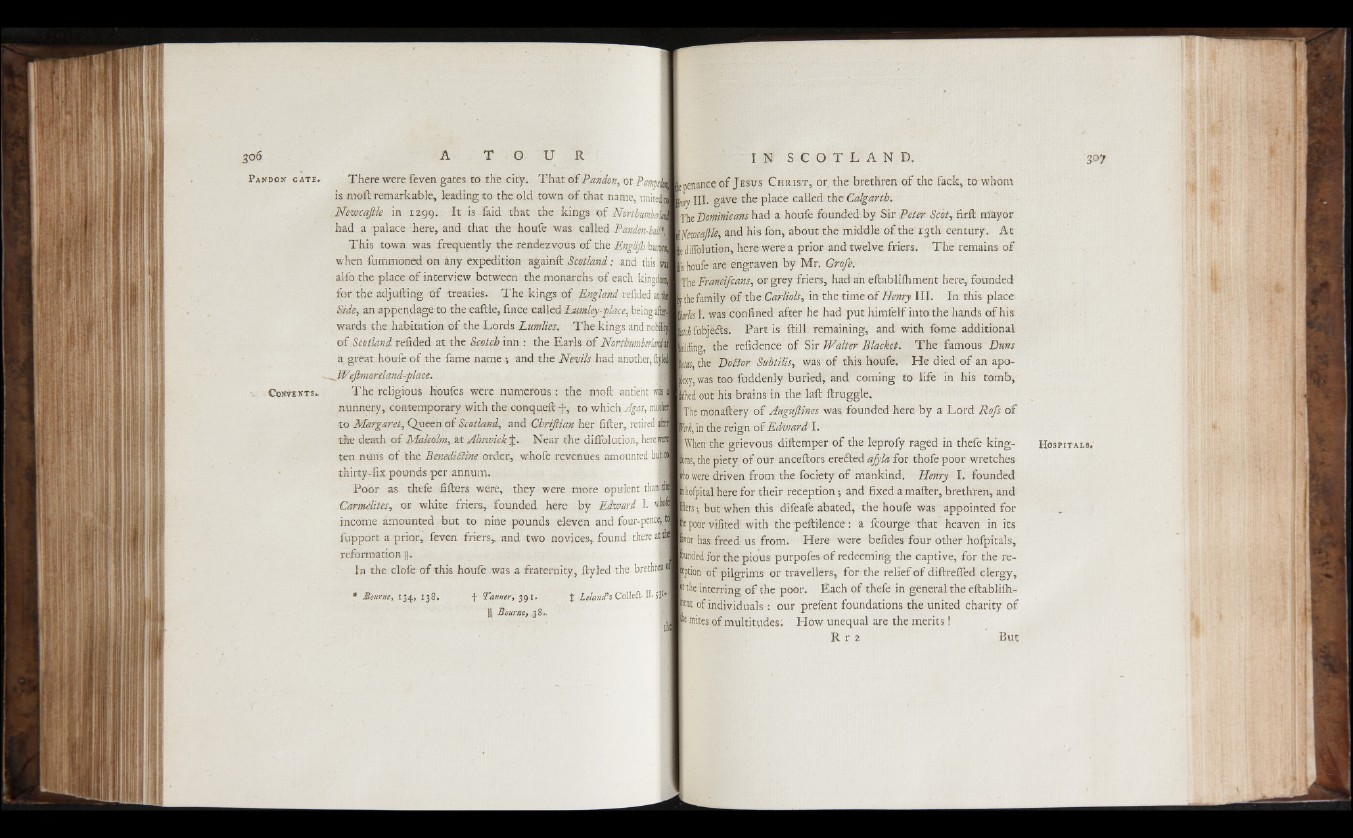
P a n d o n g a t e »
C o n v en t s »
There were feven gates to the city. That o f Pandon, or Pampd
is moft remarkable, leading to the old town of that name, u n i t e J
Newcaftle in 1299. It is faid that the kings of Nortbmnlelr
had a palace here, and that the houfe was called Pandon-hoM
This town was frequently the rendezvous of the Englilh barr
when fummoned on any expedition againft Scotland: and this wjj
alio the place of interview between the monarchs of each kinsdf
for the adjuftiog of treaties. The kings o f England refided atd
Side, an appendage to thecaftle, fince called Ewnley-place, being aw
wards the habitation of the Lords Lumlies. The kings and no»
of Scotland refided at the Scotch inn : the Earls of NorthwnbcrlaM
a great houfe of the fame name ■, and the Nevils had another,
JP'ejbmordand-place.
The religious h'ou&s were numerous: the moft antient was|
nunnery, contemporary with the oonqueft -f-, to which Agas, moth'
to Margaret, Queen of Scotland, and Chriftian her filler,, retired ¡aftf
the death of Malcolm, at Ahrwick%. Near the diffolution,. herewr
ten nuns of the BenediSfme order, whofe revenues am o u n ted butt
thirty-fix pounds per annum.
Poor as tliefe fillers were, they were more o p u le n t than 1
Carmelites, or white friers, founded here by Edward % m
income amounted but to nine pounds eleven and four-penc*
fupport a prior, feven friers, and two novices,, found there atL
reformation f.
In the clofc of this houfe was a fraternity, ftyled th e brethreil
* Mcurm, 134, 138. f Tanner, $9 1 . J Lslarci's It
|| Brnrne, 38- |
¡penance of J e s u s C h r i s t , or. the brethren of the fack, to whom
•mrj III. gave Ac place called the Calgarth.
ifhe Dominicans had a houfe founded by Sir Peter Scot, firft mayor
meweaftle, and his fon, about the middle of the 13th century. At
Uiffolution, here were a prior and twelve friers. The remains of
Is houfe are engraven by Mr. Grcfe.
[The Frtmcifeans, or grey friers, had an eftablilhment here, founded
(the family of the Carliols, in the time of Henry III. In this place
wits I. was confined after he had put himlelf into the hands of his
P fubjeits. Part is ftill remaining, and with fome additional
'ilding, the refidence of Sir Walter Blacket. The famous Duns
ito, the DoBor Suhtilis, was of this houfe. He died of an apo-
Jew, was too fuddenly buried, and coming to life in his tomb,
‘died out his brains in the laft ftruggle.
The monaftery of Auguftmes was founded here by a Lord Rofs of
f irk, in the reign of Edward I.
When the grievous diftemper of the leprofy raged in thefe king-
bms, the piety of our anceftors erefted afyla for thofe poor wretches
b were driven from the fociety of mankind. Henry I. founded
hofpital here for their reception; and fixed a mailer, brethren, and
fcrs; but when this difeafe abated, the houfe was appointed for
1 poor vifited with the peftilence : a fcourge that heaven in its
W has freed us from. Here were befides four other hofpitals,
dnded for the pious purpofes of redeeming the captive, for the re-
ption of pilgrims or travellers, for the relief of diftrefifed clergy,
[the interring of the poor. Each of thefe in general the eftablilh-
fflt of individuals : our prefent foundations the united charity of
smites of multitudes; How unequal are the merits!
R r 2 But
H o s p i t a l s .